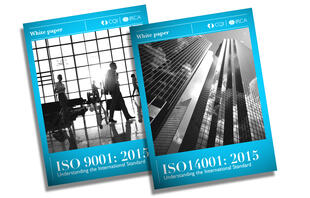
How to keep success after attaining ISO 9001 certification
Progress indicator

Achieving certification to ISO 9001 is not the end of the quality journey, says Susan Samaroo CQP MCQI.
Achieving ISO 9001:2015 certification is a significant milestone for any organisation. It demonstrates a commitment to quality management systems and a dedication to meeting customer requirements. However, the true value lies in sustaining the success and benefits obtained from ISO 9001 certification over the long term. In this article, we will delve into the reasons why it is essential to maintain and build upon the achievements gained through ISO 9001:2015 certification.
Competitive advantage
In today's global marketplace, competition is fierce. ISO 9001 certification is recognised internationally and provides a competitive edge. However, sustaining success is crucial to maintain that advantage. By delivering high-quality products or services consistently, organisations establish a reputation for reliability and trustworthiness. This reputation attracts new customers, retains existing ones, and enhances the organisation's brand value.
Consistency and continual improvement
ISO 9001:2015 is built upon the principles of continual improvement. By sustaining success after certification, organisations ensure that quality practices become ingrained in their culture. Consistency in adhering to documented processes and procedures becomes a habit, leading to improved efficiency, reduced errors and increased customer satisfaction. The pursuit of continual improvement drives organisations to identify and address areas for enhancement, fostering innovation and growth.
Continual improvement is at the core of ISO 9004:2018 Quality management – Quality of an organization – Guidance to achieve sustained success as well. It encourages organisations to establish a culture of learning, innovation and adaptability. This standard provides guidance on implementing effective improvement strategies, such as benchmarking, best practices, and innovation management, to sustain success. By regularly assessing and revising their processes, products and services, organisations can identify areas for improvement, seize opportunities, and stay ahead of the competition.
"By sustaining success after certification, organisations ensure that quality practices become ingrained in their culture. Consistency in adhering to documented processes and procedures becomes a habit, leading to improved efficiency, reduced errors and increased customer satisfaction."
Enhanced customer satisfaction:
Achieving ISO 9001:2015 certification is a clear signal to customers that an organisation is committed to delivering quality. In today's highly competitive business landscape, organisations strive to achieve sustainable success. In this pursuit, one critical factor stands out: customer satisfaction. The ability to enhance and maintain high levels of customer satisfaction plays a pivotal role in an organisation's long-term success. However, customer satisfaction cannot be taken for granted. Sustaining success ensures that customer expectations continue to be met or exceeded. By monitoring customer feedback, measuring key performance indicators, and implementing corrective actions, organisations can identify areas where improvement is needed and take proactive steps to enhance customer satisfaction.
In the pursuit of sustained success, organisations must recognise that their customers are the lifeblood of their business. Continually exceeding customer expectations and delivering exceptional experiences can pave the way for long-term prosperity in today's dynamic business environment.
Risk mitigation:
Sustaining success after ISO 9001 certification also contributes to effective risk management. A robust quality management system ensures that potential risks are identified and addressed promptly, reducing the likelihood of product or service failures, customer complaints, or compliance issues. By reviewing and updating risk assessments consistently, organisations can proactively prevent problems, protect their reputation, and avoid costly incidents or legal consequences.
Employee engagement and empowerment:
Sustained success fosters a positive work environment and boosts employee morale. When employees witness the fruits of their labour through ISO 9001 certification, they feel a sense of pride and ownership. It’s also imperative to adopt and foster a culture of collaboration, communication and continuous learning, which can help organisations tap into the knowledge, skills and creativity of their workforce.
Involving employees in quality improvement initiatives and empowering them to make decisions encourages their engagement and commitment to the success of the business. Engaged employees are more likely to contribute their best efforts, demonstrate ownership, and actively participate in achieving the organisation's goals, thus supporting sustained success. Furthermore, sustained success provides opportunities for professional growth, training and career advancement, making the business an attractive place to work.
Conclusion
While ISO 9001 certification is an impressive achievement, the real value lies in sustaining success over the long term. By consistently adhering to quality management principles and adopting the principles and best practices outlined in ISO 9004, organisations can maintain their competitive advantage, enhance customer satisfaction, mitigate risks and create a positive work environment.
Embracing a culture of continual improvement ensures that the organisation continues to evolve, adapt and thrive in an ever-changing business landscape. Sustaining success after ISO 9001 certification is not only important, but also essential for long-term growth and prosperity.
ISO 9001: Design specification consultation
In 2020, ISO’s Technical Committee 176, Sub-Committee 2 (TC 176/SC 2), the committee responsible for ISO 9001, undertook a systematic review of ISO 9001:2015 to determine whether it should be updated, left unchanged, or deleted.
Become a member
Take your quality career to the next level by becoming a member of the CQI or an IRCA Certificated Auditor.
Quality World

Get the latest news, interviews and features on quality in our industry leading magazine.
Get the latest ISO reports and resources

Our many reports and resources will help you achieve a smooth transition to ISO 9001:2015 and ISO 14001:2015.